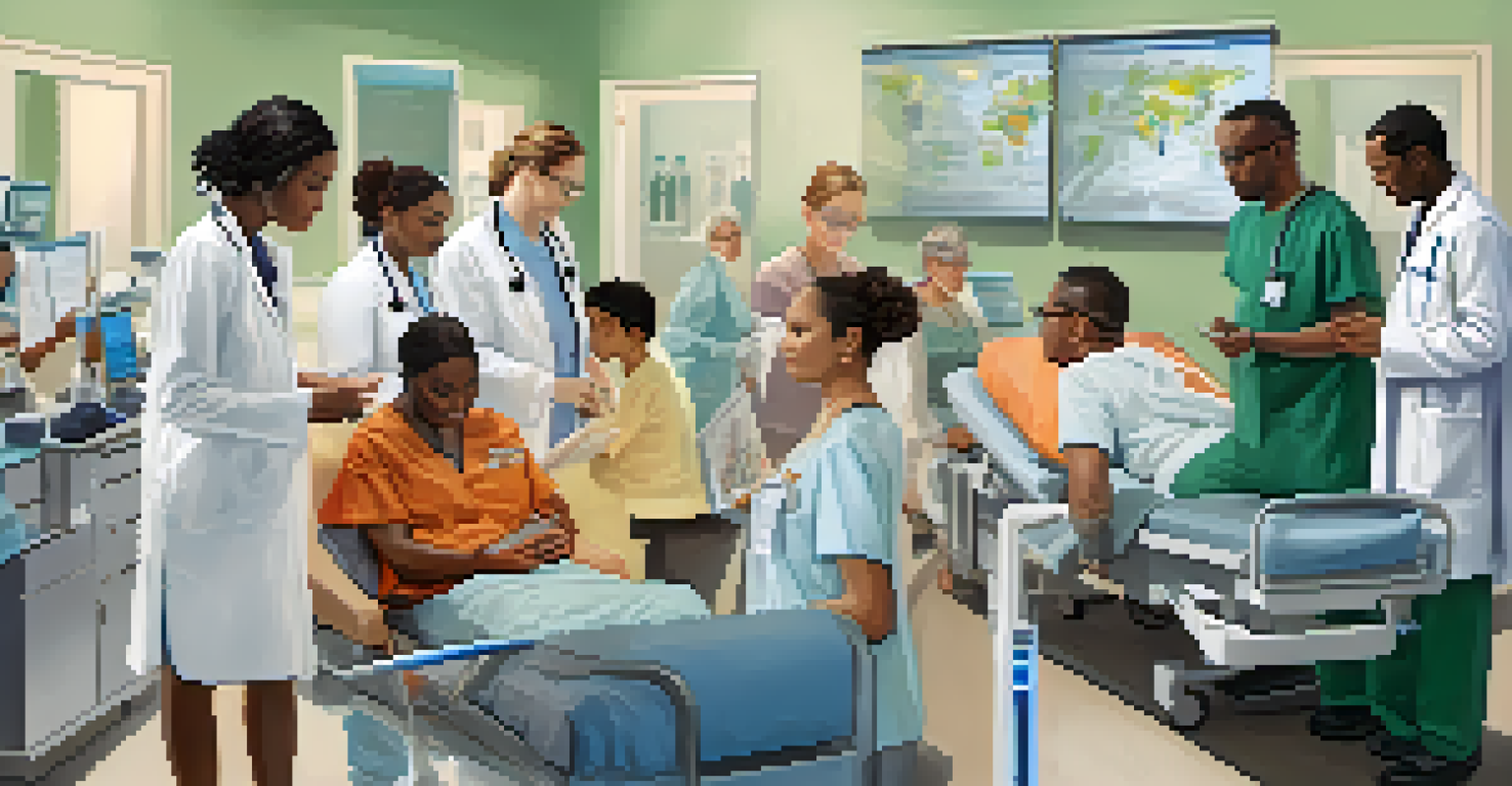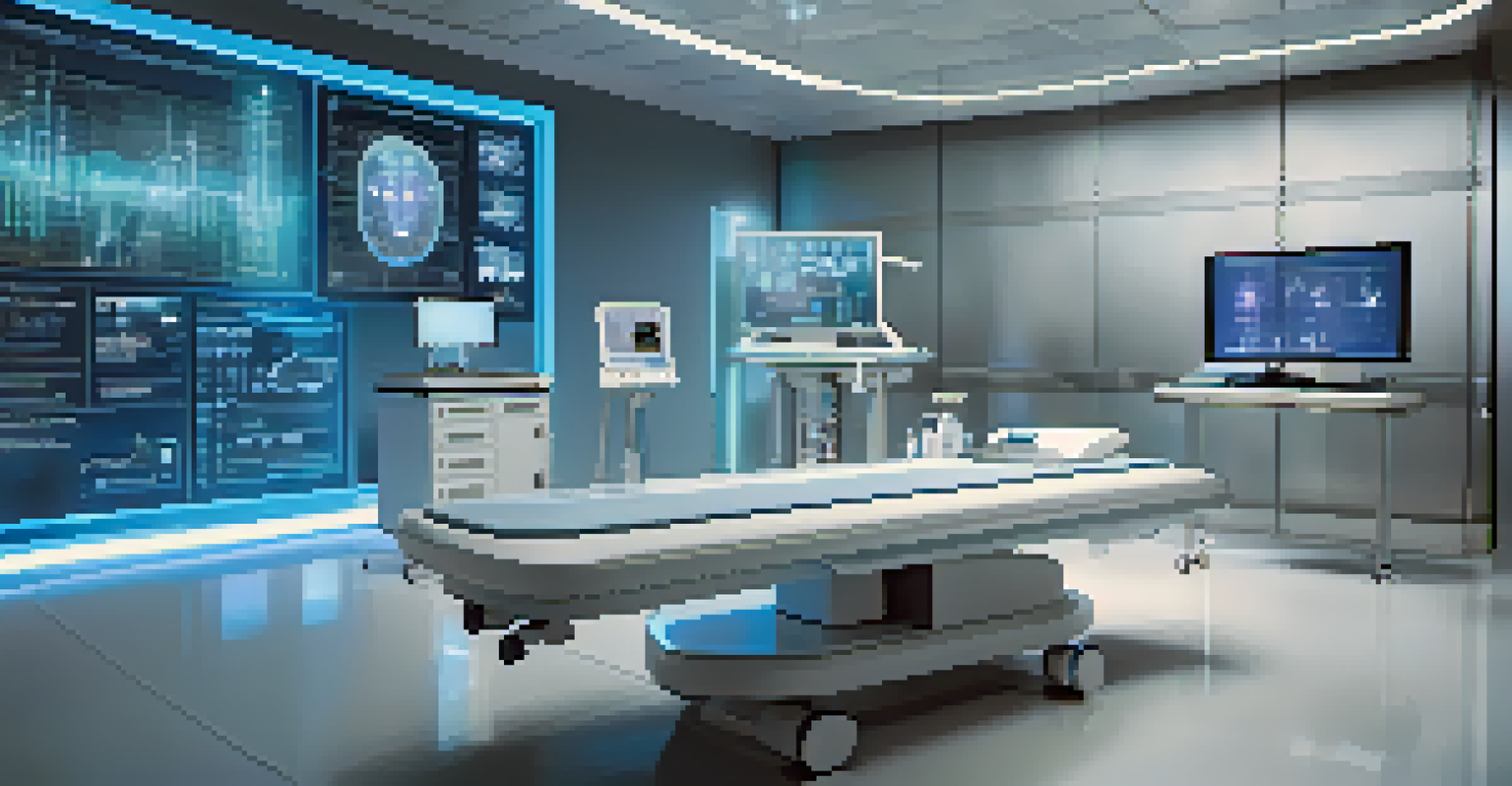Real-World Evidence: Bridging Clinical Trials and Practice

Understanding Real-World Evidence and Its Importance
Real-world evidence (RWE) refers to data collected outside of traditional clinical trials. It encompasses information from everyday healthcare settings, including patient registries, electronic health records, and even health surveys. This data helps researchers and clinicians gauge how well treatments perform in real-life scenarios, offering insights that controlled trials may miss.
Real-world evidence is the key to understanding how treatments perform in the complexities of everyday life.
The significance of RWE lies in its ability to provide a broader perspective on treatment effects. While clinical trials are essential for establishing safety and efficacy, they often involve selected participants and controlled conditions. RWE captures the diversity of patient experiences, which can lead to a more comprehensive understanding of how a treatment works across different populations.
Ultimately, RWE aims to enhance patient care by informing healthcare decisions. By bridging the gap between clinical trials and actual practice, it empowers healthcare providers to make informed choices tailored to their patients' unique needs.
The Role of RWE in Drug Development
In the drug development process, RWE plays a crucial role in shaping regulatory decisions. Regulatory agencies, like the FDA, are increasingly incorporating real-world data into their assessments. This approach not only helps in understanding how drugs perform post-approval but also assists in identifying potential safety concerns that may arise once a drug is widely used.

Moreover, RWE can streamline the drug approval process by providing additional evidence of effectiveness. For instance, if a drug shows promising results in clinical trials, RWE can further validate these findings in a real-world setting, making a compelling case for its approval. This can be particularly beneficial for treatments targeting rare conditions where clinical trials may be limited.
Real-World Evidence Enhances Care
RWE provides insights from everyday healthcare settings, improving treatment understanding and patient care.
By integrating RWE into drug development, pharmaceutical companies can better align their products with actual patient needs. This can lead to more effective treatments and improved patient outcomes, making the entire process more patient-centered.
RWE and Personalized Medicine
Personalized medicine seeks to tailor treatments to individual patients based on their unique genetic makeup, lifestyle, and preferences. RWE is instrumental in this approach, as it provides insights into how different populations respond to specific therapies. By analyzing real-world data, researchers can identify which treatments are most effective for different patient subsets.
Incorporating real-world data into the drug development process allows us to make more informed decisions that reflect actual patient experiences.
For example, if a certain medication works well for a specific demographic but not for others, RWE can highlight these disparities. This information can guide healthcare providers in making more informed decisions about treatment options, ensuring that patients receive therapies that are most likely to benefit them.
In essence, RWE bridges the gap between generalized clinical findings and personalized care, making it a powerful tool in advancing individualized treatment strategies.
Challenges in Implementing RWE
Despite its potential, implementing RWE comes with several challenges. One major hurdle is the quality of data collected outside of controlled environments. Unlike clinical trials, where data collection is standardized, real-world data can vary significantly, affecting its reliability and validity.
Additionally, privacy concerns surrounding patient data can pose obstacles to RWE research. Ensuring that data is collected and used ethically is paramount, yet navigating the regulatory landscape can be complex. Striking a balance between leveraging data for research and safeguarding patient privacy remains an ongoing challenge.
RWE Shapes Drug Development
Real-world data aids regulatory decisions and streamlines drug approval processes by validating clinical trial results.
Finally, integrating RWE into existing healthcare systems requires collaboration across multiple stakeholders, including healthcare providers, researchers, and regulatory agencies. Building these partnerships is essential for maximizing the benefits of RWE in improving patient outcomes.
Technology's Role in Advancing RWE
Technology plays a pivotal role in the collection and analysis of real-world evidence. Innovations such as big data analytics and artificial intelligence enable researchers to sift through vast amounts of data quickly and efficiently. This technological advancement allows for more robust insights into treatment effectiveness and patient experiences.
Furthermore, electronic health records (EHRs) have revolutionized how patient data is captured and shared. By harnessing EHRs, researchers can access comprehensive patient histories, making it easier to analyze outcomes across diverse populations. This wealth of information supports the generation of RWE that is both relevant and actionable.
As technology continues to evolve, so too will the methods for gathering and utilizing RWE. Embracing these advancements will ultimately enhance our understanding of healthcare practices and improve patient care.
Case Studies Highlighting RWE Impact
Numerous case studies illustrate the transformative power of real-world evidence in healthcare. For instance, a recent study on diabetes treatment showed that RWE revealed variations in medication adherence among different patient groups. This insight led to tailored intervention strategies that significantly improved health outcomes.
Another example can be found in cancer treatment, where RWE has helped identify factors influencing treatment response. By analyzing patterns in real-world data, researchers discovered that certain demographic and clinical characteristics could predict which patients would benefit most from specific therapies.
Technology Boosts RWE Collection
Advancements in technology, like big data analytics, enhance the collection and analysis of real-world evidence.
These case studies not only demonstrate the effectiveness of RWE but also highlight its potential to drive improvements in clinical practice. By learning from real-world experiences, healthcare professionals can continually refine their approaches to patient care.
The Future of RWE in Healthcare
Looking ahead, the future of real-world evidence in healthcare appears promising. As more data becomes available and methodologies for analyzing it improve, RWE will play an increasingly vital role in shaping clinical guidelines and treatment protocols. This evolution will ensure that patient care is informed by the most relevant and current information.
Moreover, the integration of RWE into healthcare policy-making will likely expand. Policymakers are recognizing the value of real-world data in crafting regulations and funding decisions. By prioritizing RWE, they can better address the needs of diverse patient populations and improve overall healthcare delivery.

In summary, the future of RWE is about fostering a more responsive and patient-centered healthcare system. By continuing to leverage real-world insights, we can enhance the quality of care and ensure that treatments are aligned with patients' real-life experiences.